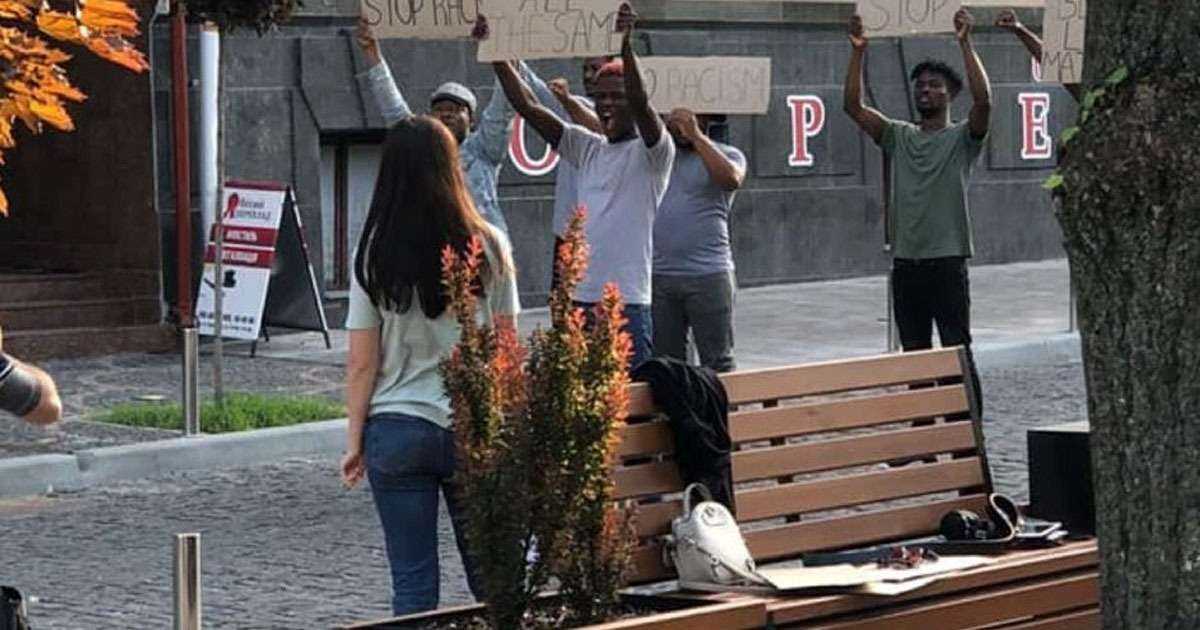on
BY SIMONE J. SMITH
“I am very quick to defend the Ukrainians for their honesty when it comes to such personal experiences of race.” Terrell Starr (Independent Scholar, New York)
The article (written by Amy Shannon Liedy) documents Terrell’s experience, and how personally impactful his research on racism in the Ukraine was for him; the speaker, who is of African-American descent explained that he was stopped by Ukrainian police 29 times during his stay in Kyiv, and this was in 2011.
He admitted that the presence of racism and xenophobia was increasing in Ukrainian society, and he asserted that improvement is not unfathomable; however, he noted that effective social change must come from above. “What I found in Ukraine,” Starr concluded, “Is that you have to find a combination of political leaders who actually try to deal with the problem.”
It appears that the political leaders of the Ukraine have not wanted to deal with this problem. This has been made clear by the recent online videos of Africans and other POC, who have not been allowed to board certain trains and other modes of transportation to flee Ukraine. Other media outlets have stated that Africans are claiming that it is because of the colour of their skin. Anyone watching the videos can clearly see the discrimination live and in living colour. There are no “claims” just realities.
This mostly appears to be happening at the Ukrainian-Polish border in the northwest region, where many allege that border agents and local police are literally letting White Ukrainians hop on in while refusing access, or limiting access to Black people. Multiple clips show African migrants being left behind at train stations, and not just that, but actually being pushed back as they try to enter.
A question that may have come to mind is, what are Africans doing in the Ukraine anyways? Great question. Outside of the fact that there are Afro-Ukranians who have settled in the Ukraine, over the last two decades, Ukraine has emerged as a choice destination for African students from Ghana, Nigeria, Zambia, and South Africa, especially in the fields of medicine and engineering. According to Ukraine’s Ministry of Education and Science, some 80,000 international students study in Ukraine with the largest number from India, followed by Morocco, Azerbaijan, Turkmenistan and Nigeria.
The Soviet government began recruiting Africans and financing their studies in the Soviet Union in 1957, which happens to be the same year as Ghana’s Independence.
This is no coincidence. At the time of decolonization [in Africa], the Soviets were trying to promote their positive image in the Third World, in large part to counterbalance anti-Soviet Western propaganda.
When communism ended in 1991, the recruiting of African students and the generous scholarships that were offered to them came all of a sudden stopped. Ukraine no longer offers the financial incentives it once did during communism, but it is still an appealing country for international students. For one, it’s easier for Africans to get a Ukrainian visa than one from a European country. Tuition and fees at a Ukrainian university are also much lighter on the wallet than an institution in Britain or the United States.
The blatant racism that is currently being seen is not new. In 2007, eight racially motivated murders occurred in Ukraine, according to the African Center. The murders continued into 2008 with some of the victims being African students. The Ukraine government did step in; the national parliament passed an anti-racism legislation and heads of African NGOs that track racial incidents claim that violent attacks have dropped significantly.
Surprisingly, many students say they had no prior knowledge of Ukraine’s xenophobia issues before arriving. One common complaint is that of being accosted with racial slurs and other demeaning language by Ukrainian youths on the streets.
Currently, there are about 900 students and in total, there are about 1,500 Ghanaians in Ukraine. According to the ministry, over a thousand Ghanaian nationals are currently studying or working in Ukraine, adding that the ministry is “gravely concerned” for their safety.
Similarly, some 4,000 Nigerians studying in tertiary institutions have been sending distress calls for their evacuation from the threat of war.
Nigeria’s Foreign Minister Geofrey Onyeama said he had spoken with his Ukrainian counterpart Dmytro Kuleba and had been assured that Ukrainian border guards had been given an order to allow all foreigners leaving Ukraine to pass without restrictions.
Nigeria’s ministry of foreign affairs has now advised its citizens leaving Ukraine to head for Hungary or Romania, rather than trying to enter Poland.
A special flight operation was announced, and the Nigerian ambassador to Romania has told the BBC that so far about 200 Nigerians – mostly students – have arrived in the capital Bucharest from Ukraine. Safiya Nuhu said many more were still arriving.
After catching wind of the racist discrimination taking place at Ukraine’s borders, Young Thug took to his Instagram Stories on Sunday, February 27th, 2022 to offer his support to the country’s African population while calling on his rap peers to chip in. “If some of my rap brothers are in I’m willing to help Africans get out of Ukraine however I can sense they are not letting us pass,” he wrote. “Whoever holds the info for these movements please contact me ASAP I’m ready.”
Africans in the Diaspora; this is a call out to all of us. Once again, we have to band together and find a way to help our young brothers and sisters out. Who is ready? Email me at simone@carib101.com with any ideas that you might have.
Stay in the loop with exclusive news, stories, and insights—delivered straight to your inbox. No fluff, just real content that matters. Sign up today!
We, as humans are guaranteed certain things in life: stressors, taxes, bills and death are the first thoughts that pop to mind. It is not uncommon that many people find a hard time dealing with these daily life stressors, and at times will find themselves losing control over their lives. Simone Jennifer Smith’s great passion is using the gifts that have been given to her, to help educate her clients on how to live meaningful lives. The Hear to Help Team consists of powerfully motivated individuals, who like Simone, see that there is a need in this world; a need for real connection. As the founder and Director of Hear 2 Help, Simone leads a team that goes out into the community day to day, servicing families with their educational, legal and mental health needs.Her dedication shows in her Toronto Caribbean newspaper articles, and in her role as a host on the TCN TV Network.













